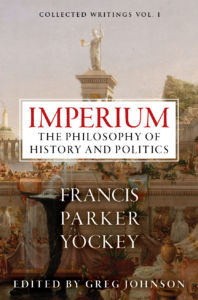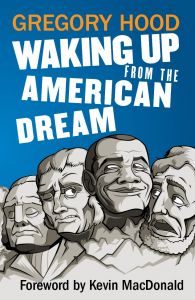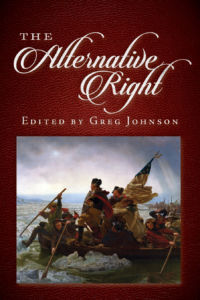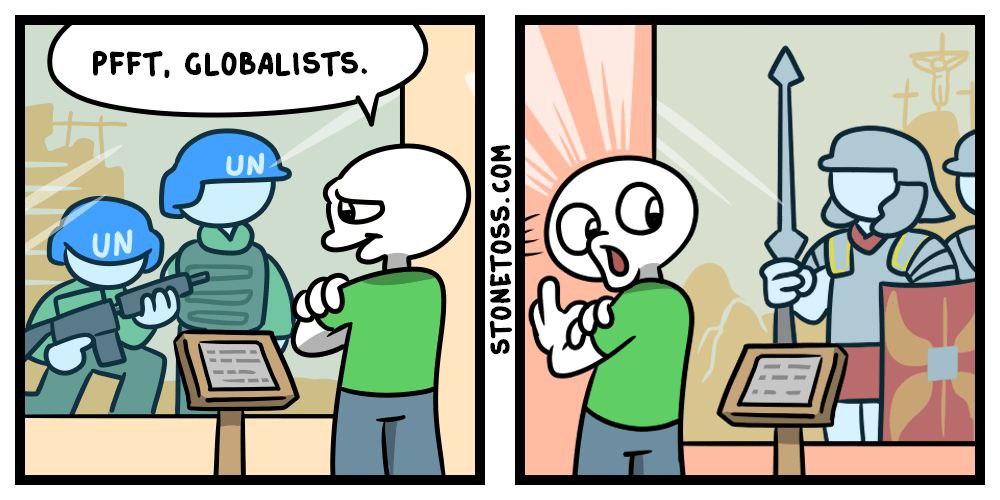Against Imperialism
Posted By Greg Johnson On In North American New Right | Comments Disabled [1]
[1]You can pre-order the Centennial Edition of Francis Parker Yockey’s Imperium here [2].
3,022 words
One of the fundamental divisions in the White Nationalist movement is between ethnonationalists and imperialists. Ethnonationalists want a world in which every distinct people has the right to a sovereign homeland. Imperialists want a single white racial state. Wilmot Robertson makes the case for ethnonationalism in his book The Ethnostate, whereas Francis Parker Yockey presents the case for imperialism in Imperium. Other advocates of imperialism include Sir Oswald Mosley, Jean Thiriart, and Guillaume Faye.
The division between imperialists and ethnonationalists is often overlooked. Both ethnonationalists and imperialists largely agree on what we dislike, and every day our enemies deliver fresh outrages to occupy our attention. By contrast, creating white ethnostates, or a unified white imperium, will only happen in the future. Why quarrel about long-term differences when we can focus on shared concerns in the present?
There’s also a muddle-headedness about the imperialist position that makes it easy to ignore. I have lost count of the times I have heard the imperialist argument put forward and then taken back at the last moment by saying we need “an imperium . . . or maybe a federation . . . or maybe an alliance” as if there is no essential difference between a single white state and a group of white states in a federation or an alliance.
There are plenty of differences between white advocates that are best set aside for the common good of the race, such as Christians versus pagans, pro-abortion versus anti-abortion, or capitalists versus socialists. There have been healthy white societies on both sides of such questions, so White Nationalists are not forced to choose between them. Different white homelands could take different positions on these issues.
But we have to deal with the question of imperialism versus ethnonationalism. The two options are mutually exclusive. If there is only one white state, there can’t be many. So we have to choose.
Why can’t we be simply “pro-white”? Because if we are serious about pro-white politics, we have to give that a concrete meaning, and that means answering the question of one state or many.
Moreover, since this is a question about our ultimate goals, it is about the essence of our movement. What makes us a movement rather than a gaggle of fellow travelers is having a common political goal. Fellow travelers have different ultimate goals but find themselves temporarily on the same path. They might share common complaints and enemies. They may be allies and companions for the time being. But because they have different destinations, they will eventually arrive at a fork in the road, where they will have to shake hands and part ways.
The freshest statement of the imperialist position is Gregory Hood’s recent American Renaissance speech “The Challenge Ahead [3]”: “What I want is a united Western Civilization-State that will ensure the physical survival of our race.”
A “civilization-state” is a new geopolitical term for an empire that defines itself in opposition to Western liberal democracy. Putin’s Russia and Xi’s China are the preeminent examples. Both are empires encompassing many nations under the cultural and political hegemony of a founding people: the Russians and Han Chinese. A white civilization state would presumably follow the same pattern: an empire embracing many peoples under the political and cultural domination of a founding people.
 [4]
[4]You can buy Greg Hood’s Waking Up From the American Dream here. [5]
I usually agree with Greg Hood, but not in this case. I don’t want a single white state for the reasons Wilmot Robertson sets forth in The Ethnostate: ethnonationalism promotes peace and diversity (political, cultural, and genetic), whereas imperialism imperils peace and diversity. A single white state will not emerge without conflict. Such a struggle is the last thing that a race demographically collapsing toward extinction needs.
This prospect is especially horrifying given the prime candidates for Herrenvolk: Germans, Russians, and Americans. These nations might have the power to establish and dominate a white imperium, but culturally and spiritually, they are among the most degenerate. Increasing their power would make almost every European nation worse off rather than better.
Hood claims that the imperium he envisions would respect “local cultures,” but this is hardly reassuring, given the record of empires past and present. Nor is it reassuring when Hood remarks that, “We have been one people before the relatively new phenomena of national identity and Christian denominational differences divided us.”
When imperialists say national identities are “relatively new,” it is like Leftists saying they are “social constructs”: it means they are slated for destruction. Moreover, the lost unity that Hood mourns didn’t always exist. Yes, much of Europe was basically one people — after Rome homogenized it. Yes, much of Europe was also Roman Catholic — after the Church destroyed all of its rivals. So much for “respecting local cultures.”
There are four principal arguments for imperialism. First, only a unified white state can secure a future for the white race. Second, nation-states and national identities are obsolete in an increasingly globalized world. Third, we are attacked as whites, so we must defend ourselves as whites; more specific ethnic and national identities don’t matter. Fourth, empires are glorious! Just think of Rome, Napoleon, Warhammer 40K.
Let’s look at how Hood reprises the classic imperialist tropes. He touches on the first three arguments in a single paragraph:
National identities themselves are relatively recent creations. They are fading with travel, technology, and geopolitical arrangements that are breaking down the nation-state. The multipolar world that is emerging is a battle between civilizations. What unites a white person in America, England, France, Germany, Italy, the Netherlands, South Africa, Australia, and every other place is stronger than what unites him to those of different races who carry the same passport. As the world becomes more connected technologically, race isn’t fading. It’s becoming more important, and it’s our opponents who insist it is central to every social interaction. We didn’t ask for this. We’re only playing the cards we were dealt.
The first argument for imperialism is that small states are weaker than large states. Therefore, to protect themselves from large non-white powers like China, small white states must amalgamate into a single white empire. As Hood puts it, “This is not a dream. It’s a necessity. Whites are a hated, shrinking, global minority. We need a geopolitical lifeboat capable of ensuring our physical existence.” Our choice is literally “join or die.”
Whites should definitely be concerned with geopolitical competition from other races and civilizations. But at best this is an argument for shifting military alliances or a more permanent treaty organization like NATO. It falls far short of an argument for a single white state. There is simply no power on Earth that requires the political unification of all white nations to resist it.
Beyond that, wars and other geopolitical crises are by their very nature interruptions in the normal order of things. They are temporary and fluid. It is foolish to institute permanent and fixed solutions to preempt temporary and fluid problems. Why would any nation permanently surrender its sovereignty to a superstate because of the possibility that it might lose its sovereignty in a war with China?
After all, surrendering sovereignty entails dangers, too. If a nation-state surrenders its sovereignty to a superstate, that virtually guarantees that alien peoples will have far more power to determine its destiny — again, to avoid the mere possibility of domination by still more alien peoples. This increases the chance that one’s culture will be homogenized and one’s population and resources will be stripped by the imperial capital. One will also risk being dragged into unnecessary wars.
Another problem with a superstate is that it puts all our eggs in one basket. If the future of the white race depends on the decisions of a single government, what happens if that government goes catastrophically wrong? Obviously, that would imperil the whole race. In such a situation, Hood’s “geopolitical lifeboat” would be more like a geopolitical Titanic, right down to the hubris, and individual nation-states would be the true lifeboats.
Imperialists, however, argue that nation-states are fading away due to globalization. They will certainly disappear if nothing is done to stop globalization. But this is an argument for resisting globalization, not going along with it.
Francis Parker Yockey poured scorn on tiny “comic opera” states. He equated national sovereignty simply with power, which means only very large states have sovereignty. Of course, since even the largest state can be destroyed if the rest of the world allies against it, that means that no nations have sovereignty, which is a reductio ad absurdum of equating sovereignty and power. Yockey simply can’t explain why some of the statelets he mocks, like Lichtenstein and Monaco, are among the oldest and most prosperous sovereign entities on the planet, even though they are also among the weakest. But life isn’t constant war.
Sovereignty is not power. It is a moral norm. In international law, a sovereign state is the equivalent of a moral person, namely someone who bears rights. Sovereign states are masters of their own internal affairs. No matter their size, they are considered to be equal under international law.
To say that small nations have no sovereignty is as incoherent as saying that weak people have no rights. Rights don’t make you bulletproof, but they do provide guidelines of proper behavior. Strong nations might invade weak nations, but the idea of sovereignty means they are wrong to do so and other nations are right to join together to resist them. Sovereign nations are not in a state of perpetual war, because moral norms matter, even to politicians.
The idea of sovereignty is as old as political thought, but the modern concept of sovereignty was created in the seventeenth century to bring an end to the religious wars by, in effect, disempowering the Pope to meddle in the internal religious affairs of nations. Its purpose was to promote peace by guaranteeing the right to differ.
Despite globalist clichés about the inevitable decline of the nation-state, it is still the foundation of global political order. Nation-states make war and peace. They educate their citizens. They regulate the media. They open and close borders. They regulate economic activity. They can bring oligarchs to heel. They control virtually all the institutions and incentives necessary to preserve or destroy their populations.
The various “globalist” treaty organizations, customs unions, and alliances like NATO, the European Union, and the United Nations, are based upon agreements among sovereign nation-states. They would evaporate overnight if enough nation-states walked away from them.
If white advocates are serious about saving our race, we need to challenge the current establishment at all levels, the higher the better, with the holy grail being control of sovereign states, which can say “no” to subsidiary powers, fellow sovereign states, and globalist entities. With enough sovereign states on our side, we can turn the world around.
Imperialists also argue that nation-states are increasingly irrelevant because national identities are fading away. But this is simply another argument for resisting globalization rather than giving in to it. Beyond that, cultural homogenization is largely superficial. Yes, Europeans increasingly consume the same goods, but there will always be different European peoples, because national identity is passed along with one’s mother tongue. English may be today’s lingua franca, but that’s nothing new. In the past it was French or Latin. But English will not be adopted by everyone, and it will remain a second or third language to most of those who learn it.
Hood argues that racial identity will eclipse national identity simply because whites are being attacked as a race and replaced as a race. “Our fate will be decided as whites. Thus, we must act as whites. It will not be as members of different nations.” But this does not follow.
Yes, we are being attacked as a race. Therefore, we need to fight back on the racial front. When you are attacked, your enemy gets to choose where and how he attacks you, and you have to respond in kind.
But just because our enemies see us as nothing but whites, that doesn’t mean they are right. There’s more to our identity than just race. Language, culture, and ethnicity also matter.
Hood, however, seems to allow our enemies to define us: “Being white is the most meaningful identity we have. Our rulers gave us a negative one. We need a positive one.” Because of this, Hood argues that “we are a people, not simply a group of peoples,” and one people needs one state.
But whites are a race, not a people, because peoplehood presupposes a common language and culture, whereas whites have many different languages and cultures, alongside a common genetic and cultural heritage. White Nationalism, therefore, cannot mean one white state for one white people. Instead, it can only mean national self-determination for all white peoples.
Hood likens his dream to the Roman Empire, which he thinks was glorious. I confess it leaves me cold. The Roman Empire left magnificent ruins, but it was a catastrophe to the peoples it conquered. Julius Caesar alone killed more than a million Gauls — at a time when one had to look one’s victims in the eye — to add France to the Roman Empire. No white empire has even been created without spilling oceans of white blood, on all sides. For a dying race, this is sheer madness. Thus, it is a fair question: How many millions of Europeans are today’s imperialists willing to kill to create their dream?
Hood makes it very clear that we can’t just defer debating imperialism versus ethnonationalism forever. One’s answer will define the essence of our movement and determine the meaning of everything we do today:
There are more white advocates than ever, all looking for something to do, all pushing in a million different directions. We must have a final goal that gives us a common direction, even if we disagree on tactics, ideology, or organizational missions. The Western Imperium, the sacral empire that would unite and protect the white race, is that final goal.
Of course, one danger of insisting that all white advocates pursue the same goal is that fewer people will get involved. But this is a debate that we cannot avoid. Moreover, if one chooses imperialism, we will not be able to defer all the other divisive questions, either. For if there is only one white state, there can be only one answer to such questions as capitalism versus socialism.
Another reason we can’t defer the imperialism versus ethnonationalism question is that one’s attitudes on this matter influence one’s present-day political stances. Although imperialists often present themselves as utopian dreamers, they are often apologists for quite grubby contemporary power agglomerations, as long as they are opposed to ethnonationalism.
 [7]
[7]You can buy The Alternative Right, ed. Greg Johnson, here [8]
For instance, before abandoning the Right altogether, Richard Spencer was a well-known standard-bearer for imperialism. From 2013 on, Spencer favored Russian imperialism over Ukrainian nationalism, the United Kingdom over an independent Scotland, the European Union over an independent United Kingdom, and Spain over an independent Catalonia. It was certainly consistent, but what did it have to do with white advocacy?
Currently the white race is facing extinction though low fertility, miscegenation, and replacement migration imposed by the existing political establishment, which exercises power through both national and transnational institutions. To save ourselves, we need to replace the establishment before it replaces us. That means that we need power — which means we need to contest power at all levels.
But Spencer’s imperialism led him to denigrate even explicitly pro-white ethnonationalist movements as “petty” while defending anti-white imperial agglomerations simply because they are larger and more powerful. This makes no sense if one’s primary concern is white survival. Indeed, it only makes sense if one is primarily a power-worshipper, which is what Spencer turned out to be. This is why he left the Dissident Right altogether. He followed the power.
Hood’s imperialism also leads to incoherence in the face of present-day politics:
What is to be done? We will build tribes, churches, networks. We will turn our backs on their world and build our own. . . . We will build political power locally and wield it where we can. And we will build towards the dream of a Western Imperium that is our destiny, that will bind our people together in unity, honor, and strength.
Hood counsels us here to think both very big and very small. “Building strength locally is a first step, and it allows for political action.” This is true. But if one can organize locally, why not regionally and nationally as well? How can one get from the local to the universal without passing through the nation-state?
Hood clearly thinks that demographic change is too advanced in the United States for a pro-white force to gain national power. (The proper lesson for Americans is to give up on democracy, not America.)
But in most white countries, it is still possible for pro-white forces to vie for national power. Why pass up the chance? Why seek power only on the local level, which can be annulled on the national level, but not seek national power within existing sovereign states?
Because this is the logic of the imperialist dream: “Our fate will be decided as whites. Thus, we must act as whites. It will not be as members of different nations.” To believe in the imperium commits one to the idea that there’s no point in contesting power in nation-states, even though that is where actual sovereignty resides. This is simply self-defeating.
In sum, I advocate ethnonationalism because I believe that it promotes peace and diversity by giving distinct peoples their own sovereign homelands. I oppose imperialism because it increases conflict and decreases diversity. Moreover, I have explained why I don’t find the arguments for preferring imperialism to ethnonationalism convincing. Finally, ethnonationalism is politically realistic because it can build upon existing political movements and existing sovereign states, whereas imperialism offers high-minded rhetoric but no concrete path to white survival.
The debate between imperialists and ethnonationalists cannot be avoided, because it concerns the very essence of our movement. Indeed, are we one movement or two? Nor can the debate be postponed, because one’s answer has concrete implications for the movement today. I look forward to continuing the conversation.
* * *
Counter-Currents has extended special privileges to those who donate $120 or more per year.
- First, donor comments will appear immediately instead of waiting in a moderation queue. (People who abuse this privilege will lose it.)
- Second, donors will have immediate access to all Counter-Currents posts. Non-donors will find that one post a day, five posts a week will be behind a “Paywall” and will be available to the general public after 30 days.
- Third, Paywall members have the ability to edit their comments.
- Fourth, Paywall members can “commission” a yearly article from Counter-Currents. Just send a question that you’d like to have discussed to [email protected] [9]. (Obviously, the topics must be suitable to Counter-Currents and its broader project, as well as the interests and expertise of our writers.)
To get full access to all content behind the paywall, sign up here:
Paywall Gift Subscriptions
 [10]If you are already behind the paywall and want to share the benefits, Counter-Currents also offers paywall gift subscriptions. We need just five things from you:
[10]If you are already behind the paywall and want to share the benefits, Counter-Currents also offers paywall gift subscriptions. We need just five things from you:
- your payment
- the recipient’s name
- the recipient’s email address
- your name
- your email address
To register, just fill out this form and we will walk you through the payment and registration process. There are a number of different payment options.
